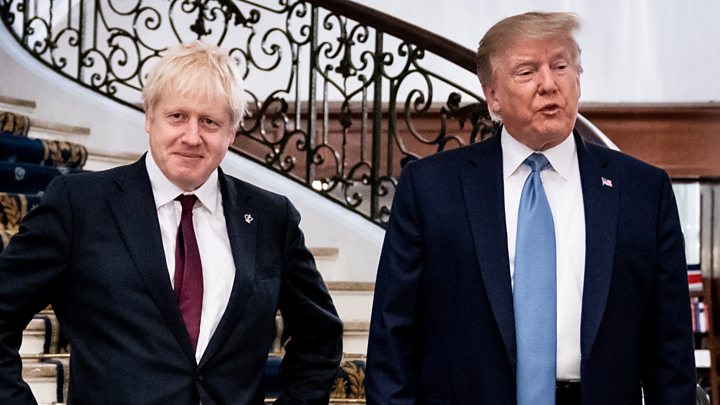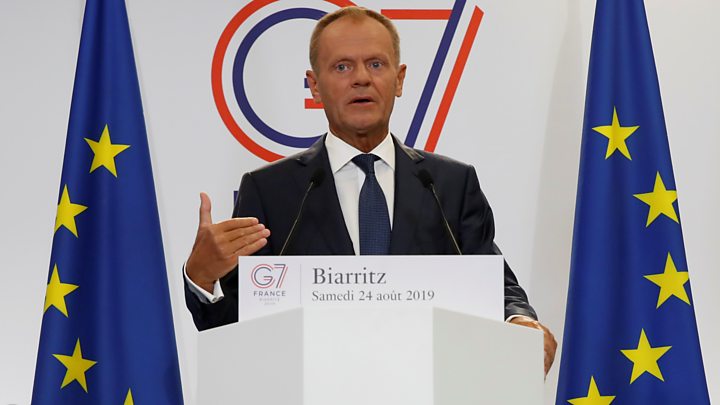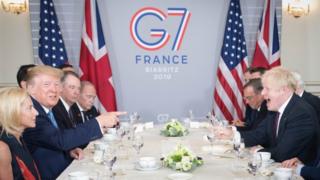President Trump has promised a "very big trade deal" with the UK, saying its departure from the EU will be like losing "an anchor round the ankle".
Mr Trump was speaking after a breakfast meeting with Mr Johnson at the G7 summit in Biarritz in France.
But Mr Johnson said the US must open up its markets if a post-Brexit trade deal is to be agreed.
"I don't think we sell a single joint of British lamb in the United States, we don't sell any beef," the PM said.
Mr Johnson's breakfast meeting came before a day of discussions with other world leaders at the summit.
The PM will meet European Council President Donald Tusk, a day after the two men gave clashing statements over who would be held responsible for a no-deal Brexit.

Speaking to reporters after the working breakfast, Mr Trump said a deal with the UK would happen "quickly".
"We're going to do a very big trade deal, bigger than we've ever had with the UK," he said.
"And now at some point they won't have the obstacle, they won't have the anchor around their ankle, because that's what they have."
Before his talks with the US President, Mr Johnson spoke about "massive opportunities for the UK to prise open the American market".
As a member of the European Union, the UK cannot make its own trade deals with other countries - and the EU does not have a free trade deal with the US.
The UK has already agreed 13 "continuity" deals with 38 countries that will apply post-Brexit.
- UK 'first in line' for US trade deal, says Trump adviser
- 'No chance of US deal' if Brexit hits Irish accord
- What trade deals has the UK done so far?
Offering an example of an American trade restriction, Mr Johnson said: "Melton Mowbray pork pies, which are sold in Thailand and in Iceland, are currently unable to enter the US market because of, I don't know, some sort of food and drug administration restriction."
He continued: "UK bell peppers cannot get into the US market at all.
"Wine shipments are heavily restricted. If you want to export wine made in England to the US you have to go through a US distributor.
"There is a tax on British micro-breweries in the US that doesn't apply to US micro-breweries in the UK."
Last month, President Trump said talks about a "very substantial" trade deal with the UK were already under way.
He said a bilateral post-Brexit deal could lead to a "three to four, five times" increase in current trade - but provided no details about how that would be achieved.
However, the Speaker of the US House of Representatives, Nancy Pelosi, said a UK-US trade deal would not get through Congress if Brexit undermined the Good Friday Agreement.
Ms Pelosi said the UK's exit from the EU could not be allowed to endanger the 1998 Irish peace deal, which the US helped facilitate.
What is a trade deal?
Trade deals involve two or more countries agreeing a set of terms by which they buy and sell goods and services from each other.
Deals are designed to increase trade by eliminating or reducing trade barriers. These barriers might include import or export taxes (tariffs), quotas, or differing regulations on things such as safety or labelling.
Mr Johnson also discussed the possibility of a tax on internet giants, following the French government's decision to approve a digital services tax despite threats of retaliation by the US.
"Frankly, we must do something to tax fairly and properly the online businesses that have such colossal sales in our country," he said.
"I am open to discussion about how we do that and I am willing to listen to our American friends about the modalities."

With Brexit on the agenda when the prime minister meets Mr Tusk, Downing Street dismissed as "entirely false" newspaper suggestions the government was considering suspending Parliament "in order to stop MPs debating Brexit".
The Observer said it had seen an email to a No 10 adviser making clear the PM was seeking legal advice on whether parliament could be shut down for five weeks from 9 September, in what the paper said appeared to be "a concerted plan to stop MPs forcing a further extension to Brexit".
Mr Johnson's allies believe he has other options to outmanoeuvre MPs who are seeking to block no deal - though they insist he wants to leave the EU with a deal.







0 Comments